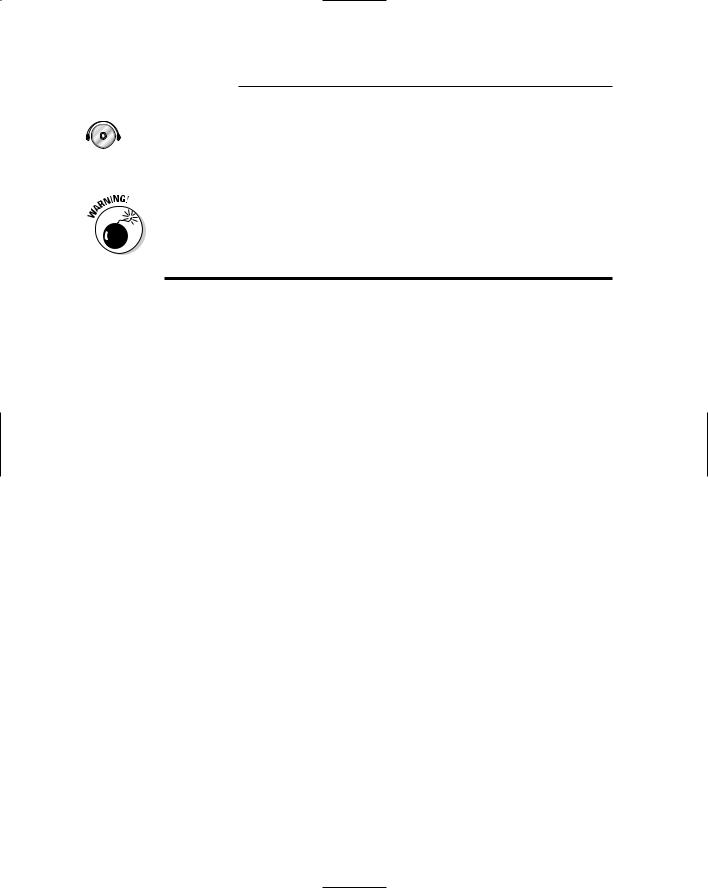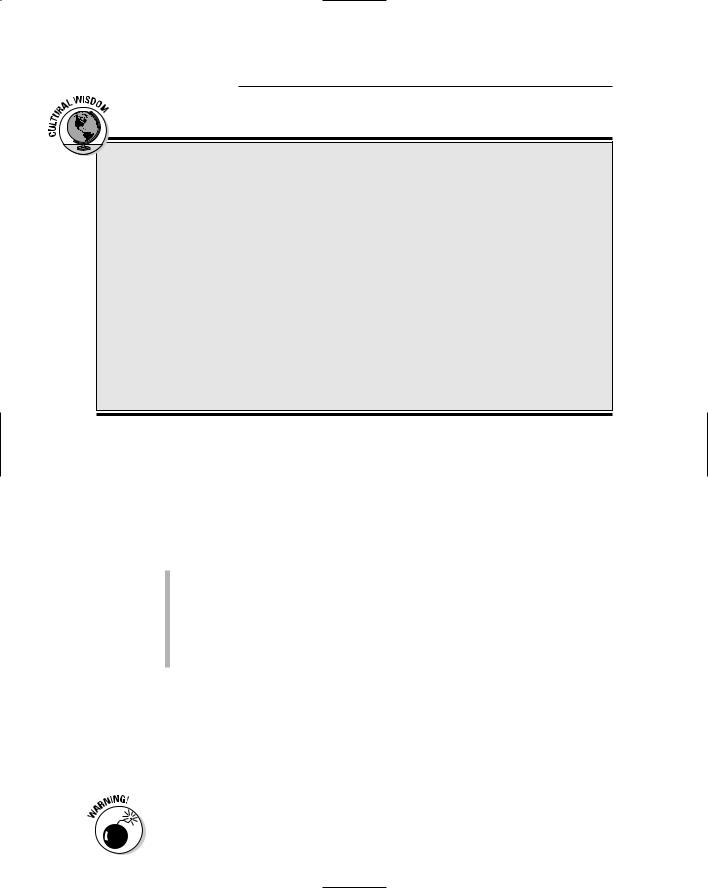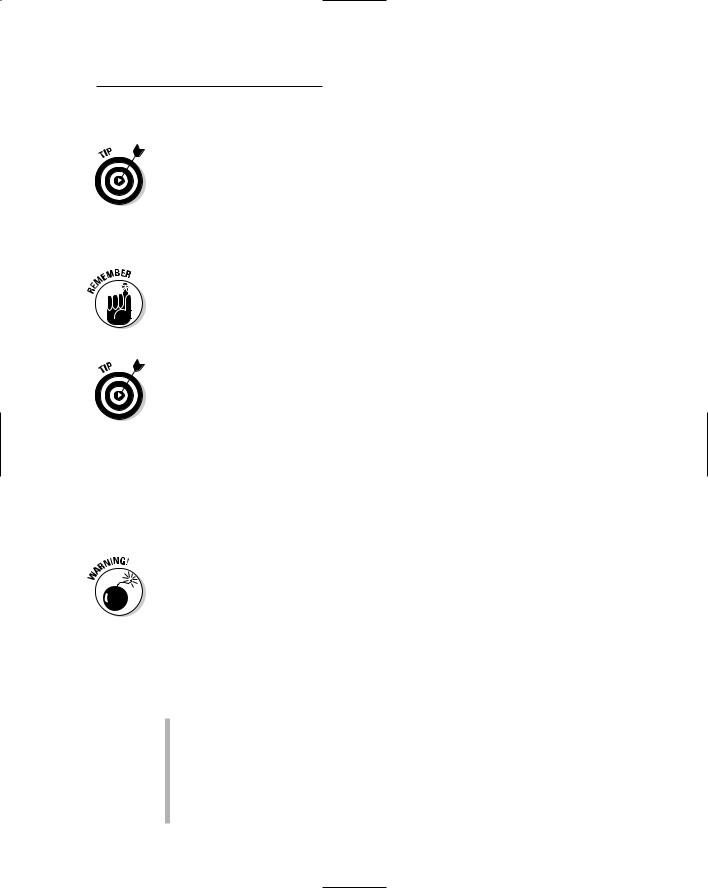
Russian For Dummies
.pdf
14 |
Part I: Getting Started |
|
|
|
|
||
|
Irina: |
Nye soglasna. Samyye intyeryesnyye pryedmyety v |
|
|
|
|
etom universityetye sotsiologiya, istoriya, algyebra, |
|
|
|
muzyka i tyeatr. |
|
|
|
nee-sahg-lahs-nuh. sah-mih-ee een-tee-ryes-nih-ee |
|
|
|
preed-mye-tih v eh-tuhm oo-nee-veer-see-tye-tee suh- |
|
|
|
tsih-ah-loh-gee-ye, ees-toh-ree-ye, ahl-geeb-ruh, |
|
|
|
moo-zih-kuh ee tee-ahtr. |
|
|
|
I disagree. The most interesting subjects at this univer- |
|
|
|
sity are sociology, history, algebra, music, and theater. |
|
Vladmir: |
A tvoj profyessor po lityeraturye intyeryesnyj? |
|
|
|
|
ah tvohy prah-fye-suhr puh lee-tee-ruh-too-ree een- |
|
|
|
tee-ryes-nihy? |
|
|
|
Is your literature professor interesting? |
|
Irina: |
Da, intyeryesnyj, no u nyego bol’shoj nos i on vysokij |
|
|
|
|
kak zhiraf. |
dah, een-tee-ryes-nihy, noh oo nee-voh bahl’-shohy nohs i ohn vih-soh-keey kahk zhih-rahf.
Yes, he’s interesting, but he has a big nose, and he’s as tall as a giraffe.
Words to Know
ya schitayu |
ya sh’ee-tah-yu shtoh |
I believe that |
ochyen’ |
oh-cheen’ |
very |
pryedmyety |
preed-mye-tih |
academic subjects |
nye soglasna |
nee sahg-lahs-nuh |
I disagree |
u nyego |
oo nee-voh |
he has |

Chapter 1: You Already Know a Little Russian 15
Looking at the Russian Alphabet (It’s Easier than You Think)
If you’re like most English speakers, you probably think that the Russian alphabet is the most challenging aspect of picking up the language. The idea of having to memorize all those letters, some of them weird-looking, can be a little bit daunting to the newcomer. But not to worry. The Russian alphabet isn’t as hard as you think. In fact, compared to some other features of Russian, such as case ending and verbs (see Chapter 2 for details on those), the alphabet is a piece of cake. When you’re done with this section, you’ll be able to recognize and pronounce all the letters of the Russian alphabet.
From A to Ya: Making sense of Cyrillic
The Russian alphabet is based on the Cyrillic alphabet, which was named after the ninth-century Byzantine monk, Cyril (see the sidebar “Who was this Cyril guy, anyway?” later in this chapter). Throughout the centuries, Cyril’s original alphabet went through many attempts to shorten it from its original 43 letters. Today the alphabet is still pretty lengthy — 33 letters in all, compared with the 26 letters in the English alphabet. But don’t panic. You don’t have to master every letter. Throughout this book, we convert all the letters into familiar Latin symbols, which are the same symbols we use in the English alphabet. This process of converting from Cyrillic to Latin letters is known as transliteration. We list the Cyrillic alphabet below for those of you who are adventurous and brave enough to prefer reading real Russian instead of being fed with the ready-to-digest Latin version of it. And even if you don’t want to read the real Russian, check out Table 1-1 to find out what the whole fuss is about regarding the notorious “Russian alphabet.”
Notice that in most cases a transliterated letter corresponds to the way it’s actually pronounced. As a rule, you may assume that the transliteration fairly well represents the actual pronunciation. The biggest exceptions to this are the letter Jj, which is transcribed as j but pronounced like an English y, and the soft sign :;, which is transcribed as ’ but only softens the preceding consonant.

16 |
Part I: Getting Started |
As we walk you through the Russian alphabet, pay attention to the way the alphabet is transliterated, because that’s how we spell out all the Russian words throughout the rest of the book. Table 1-1 has the details on Cyrillic letters, their transliteration, and their pronunciation. You can also find a guide to pronunciation on the audio CD that comes with this book.
Scholars do not agree on the letter j. Some believe that it’s a consonant; others think that it’s a vowel. We don’t want to take sides in this matter and are listing it both as a consonant and a vowel.
Table 1-1 |
|
The Russian Alphabet in Cyrillic |
|
The Letter |
Transliteration |
Pronunciation |
Vowel or |
in Cyrillic |
(The Corresponding |
Consonant |
|
|
Letter or Sound |
|
|
|
in the English |
|
|
|
Alphabet) |
|
|
Aa |
A |
ah if stressed as in father; |
Vowel |
|
|
uh if appearing in any unstressed |
|
|
|
syllable, as in human |
|
|
|
|
|
Bb |
B |
b as in book; p if at the end |
Consonant |
|
|
of the word |
|
|
|
|
|
Vv |
V |
v as in Victor; f if at the end |
Consonant |
|
|
of the word |
|
|
|
|
|
Gg |
G |
g as in great; k if at the end of |
Consonant |
|
|
the word |
|
|
|
|
|
Dd |
D |
d as in duck; t if at the end |
Consonant |
|
|
of the word |
|
|
|
|
|
Ee |
Ye |
ye as in yes; ee as in seek if appear- |
Vowel |
|
|
ing in any unstressed syllable |
|
|
|
|
|
|\ |
Yo |
yo as in yoke |
Vowel |
|
|
|
|
"… |
Zh |
zh as measure; sh if at the end |
Consonant |
|
|
of the word |
|
|
|
|
|
Zz |
Z |
z as in zebra; s if at the end |
Consonant |
|
|
of the word |
|
|
|
|
|
Ii |
I |
ee as in peek |
Vowel |
|
|
|
|
Jj |
J |
very short y as boy or May |
Vowel or |
|
|
|
Consonant |
|
|
|
|
Kk |
K |
k as in Kate |
Consonant |
|
|
|
|
Ll |
L |
l as in lamp |
Consonant |
|
|
|
|

|
|
|
Chapter 1: You Already Know a Little Russian |
17 |
||
|
|
|
||||
|
|
|
|
|
|
|
|
The Letter |
Transliteration |
Pronunciation |
Vowel or |
|
|
|
in Cyrillic |
(The Corresponding |
Consonant |
|
||
|
|
Letter or Sound |
|
|
|
|
|
|
in the English |
|
|
|
|
|
|
Alphabet) |
|
|
|
|
|
Mm |
M |
m as in mommy |
Consonant |
|
|
|
|
|
|
|
|
|
|
Nn |
N |
n as in note |
Consonant |
|
|
|
|
|
|
|
|
|
|
Oo |
O |
oh as in as in talk; ah as in park, |
Vowel |
|
|
|
|
|
if appearing one syllable before |
|
|
|
|
|
|
the stressed syllable; uh as in |
|
|
|
|
|
|
Mormon, if appearing in any other |
|
|
|
|
|
|
unstressed syllable |
|
|
|
|
Pp |
P |
p as in port |
Consonant |
|
|
|
|
|
|
|
|
|
|
Rr |
R |
flap r, similar to trilled r in Spanish, |
Consonant |
|
|
|
|
|
as in “madre,” for example |
|
|
|
|
|
|
|
|
|
|
|
Ss |
S |
s as in sort |
Consonant |
|
|
|
|
|
|
|
|
|
|
Tt |
T |
t as in tie |
Consonant |
|
|
|
|
|
|
|
|
|
|
Uu |
U |
oo as shoot |
Vowel |
|
|
|
|
|
|
|
|
|
|
Ff |
F |
f as in fact |
Consonant |
|
|
|
|
|
|
|
|
|
|
Xx |
Kh |
kh like you’re clearing your throat, |
Consonant |
|
|
|
|
|
or like the German “ch” |
|
|
|
|
|
|
|
|
|
|
|
Cc |
Ts |
ts as in cats |
Consonant |
|
|
|
|
|
|
|
|
|
|
Hh |
Ch |
ch as in chair |
Consonant |
|
|
|
|
|
|
|
|
|
|
Ww |
Sh |
sh as in shock |
Consonant |
|
|
|
|
|
|
|
|
|
|
}] |
Sh’ |
soft sh, as in sheep |
Consonant |
|
|
|
|
|
|
|
|
|
|
= |
‘’ |
hard sign (makes the preceding |
Neither |
|
|
|
|
|
letter hard) |
|
|
|
|
Yy |
Y |
ih |
Vowel |
|
|
|
|
|
|
|
|
|
|
; |
‘ |
soft sign (makes the preceding |
Neither |
|
|
|
|
|
letter soft) |
|
|
|
|
|
|
|
|
|
|
|
?/ |
E |
e as in end |
Vowel |
|
|
|
|
|
|
|
|
|
|
{[ |
Yu |
yu as in use |
Vowel |
|
|
|
|
|
|
|
|
|
|
Ya |
ya if stressed as in yard; ee if |
Vowel |
|
||
|
|
|
unstressed and not in the final |
|
|
|
syllable of the word; ye if unstressed and in the final syllable of the word

18 |
Part I: Getting Started |
Who was this Cyril guy, anyway?
Picture this: The year is sometime around AD 863. Two Byzantine monks and brothers, Cyril and Methodius, were commissioned by their emperor to Christianize the East European pagan tribes. To carry out the emperor’s order, the two brothers had to transcribe the Bible into Slavic. This task was very daunting because the Slavs didn’t have any written language at the time and the Slavic dialect they were working with contained a lot of bizarre sounds not found in any other language.
One of the brothers, Cyril, came up with an ingenious idea: create a Slavic alphabet from a mishmash of Greek, Hebrew, and old Latin
words and sounds. That was a clever solution because by drawing on different languages, Cyril’s alphabet contained practically every sound necessary for the correct pronunciation of Russian.
In honor of Cyril’s clever idea, the alphabet became known as the Cyrillic alphabet. The Cyrillic script is now used by more than 70 languages, ranging from Eastern Europe’s Slavic languages (Russian, Ukrainian, Belorussian, Bulgarian, Serbian, and Macedonian) to Central Asia’s Altaic languages (Turkmen, Uzbek, Kazakh, and Kirghiz).
I know you! Familiar-looking, same-sounding letters
You may notice that some of the Russian letters in the previous section look a lot like English letters. The letters that look like English and are pronounced like English letters are:
Aa
Kk
Mm
Oo
Tt
Whenever you read Russian text, you should be able to recognize and pronounce these letters right away.
Playing tricks: Familiar-looking, different-sounding letters
Some Russian letters look like English letters but are pronounced differently. You want to watch out for these:

Chapter 1: You Already Know a Little Russian 19
Vv: It looks like English Bb, at least the capital letter does, but it’s pronounced like the sound v as in victor or vase.
Ee: This one’s a constant annoyance for English speakers, who want to pronounce it like ee, as in the English word geese. In Russian, it’s pronounced that way only if it appears in an unstressed syllable. Otherwise, if it appears in a stressed syllable, it is pronounced like ye as in yes.
|\: Don’t confuse this with the letter Ee. When two dots appear over the Ee, it’s considered a different letter, and it is pronounced like yo as in yoke.
Nn: It’s not the English Hh. It just looks like it. Actually, it’s pronounced like n as in Nick.
Rr: In Russian it’s pronounced like a trilled r and not like the English letter p as in Peter.
Ss: This letter is always pronounced like s as in sun and never like k as in victor.
Uu: This letter is pronounced like oo as in shoot and never like y as in yes.
Xx: Never pronounce this letter like z or ks as in the word Xerox. In Russian the sound it represents is a coarse-sounding, guttural kh, similar to the German ch. (See “Surveying sticky sounds,” later in this chapter, for info on pronouncing this sound.)
How bizarre: Weird-looking letters
As you’ve probably noticed, quite a few Russian letters don’t look like English letters at all:
Bb |
|
Cc |
Gg |
|
Hh |
Dd |
|
Ww |
"' |
|
}] |
Zz |
|
= |
Ii |
|
Yy |
Jj |
|
: |
Ll |
|
?/ |
Pp |
|
{[ |
Ff |
|
|
|

20 |
Part I: Getting Started |
Don’t panic over these letters. Just because they look weird doesn’t mean they’re any harder to say than the others. It’s just a matter of memorizing their proper pronunciations. (Refer to Table 1-1 for details on how to say each letter.)
You may recognize several of these weird letters, such as F, G, Z, L, P, from learning the Greek alphabet during your fraternity or sorority days.
Sounding Like a Real Russian with Proper Pronunciation
Compared to English pronunciation, which often has more exceptions than rules, Russian rules of pronunciation are fairly clear and consistent. In this section, you discover some of the basic rules and patterns of Russian pronunciation and find out about important irregularities with vowels and consonants. In addition, we show you how to say some of the more difficult letters and sounds.
Understanding the one-letter-one-sound principle
Russian is a phonetic language, which means that for the most part one Russian letter corresponds to one sound. For example, the letter K is always pronounced like k, and the letter M is always pronounced like m. This pattern is different from English, where a letter can be pronounced in different ways depending on where it shows up in a word. For instance, consider the two different pronunciations for the letter c in the words cat and race. This difference almost never happens in Russian.
Giving voice to vowels
Vowels are the musical building blocks of every Russian word. If you flub a consonant or two, you’ll probably still be understood. (To avoid such flubs, though, check out “Enunciating consonants correctly,” later in this chapter.) But if you don’t pronounce your vowels correctly, there’s a good chance you won’t be understood at all. So it’s a good idea to get down the basic principles of saying Russian vowels, which we cover in the following sections.

Chapter 1: You Already Know a Little Russian 21
That’s stretching it: Lengthening out vowels
If you want to sound more Russian, don’t shorten your vowels like English speakers often do. When you say a, o, or u, open your mouth wider and purposefully stretch out the sounds to make them a little bit longer. Imagine, for example, that you’re in your room on the second floor, and your mom is downstairs in the kitchen. You call her by saying “Mo-o-o-m!” That’s the way Russians say their vowels (except for the shouting part!).
Some stress is good: Accenting the right vowels
Stress is an important concept in Russian. Putting a stress in the wrong place isn’t just a formal mistake. It can hinder communication, because the meaning of a word can change based on where the stress is. For example, the word zamok (zah-muhk) means “castle.” However, if you shift the stress from the first syllable to the last, the word zamok (zuh-mohk) now means “lock.”
Unfortunately, no (hard and fast) rules about stress exist. Stress in Russian is unpredictable and erratic, though you begin to recognize some patterns as you learn more. The harsh truth, however, is that each word has its own stress pattern. What happens if you stress the vowel in the wrong place? Certainly, nothing terrible: the earth will continue to rotate around its axis. What may happen, however, is that your interlocutor will have a hard time understanding you and take longer to grasp what you really mean. Before learning a new Russian word, find out which vowel to stress. Look in any Russian-English dictionary, which usually marks stress by putting the sign ´ over the stressed syllable. In a dictionary, zamok (zah-muhk; castle) is written za⁄mok, and zamok (zuh-mohk; lock) is written zamo⁄k.
Vowels misbehavin’: Reduction
Some Russian letters change their behavior depending on whether they’re in a stressed or an unstressed syllable. The vowels a, o, ye, and ya do this a lot. When stressed, they behave normally and are pronounced in the usual way, but when they’re in an unstressed position, they go through a process called reduction. This deviation in the vowels’ behavior is a very important linguistic phenomenon that deserves your special attention. Not knowing it is like a double-edged sword: not only does it take other people longer to understand you (they simply won’t recognize the words you’re saying), but you also may find it hard to recognize the words you think you already know (but unfortunately store in your own memory with the wrong stress).
O, which is normally pronounced like oh, sounds like ah (like the letter a in the word father) if it occurs exactly one syllable before the stressed syllable, and like a neutral uh (like the letter a in the word about) if it appears in any other unstressed syllable.
A, which is pronounced like ah when it’s stressed, is pronounced like a neutral uh (like the letter a in the word about) if it appears in any unstressed syllable.

22 |
Part I: Getting Started |
The honest-to-goodness truth is that when the letter a appears in the syllable preceding the stressed syllable, its pronunciation is somewhere between uh and ah. We don’t, however, want to burden you with excessive linguistic information, so we indicate the letter a as uh in all unstressed positions, even though we realize that some persnickety Russian language phonologists (pronunciation specialists) may take issue. Moreover, in conversational speech, catching the distinction is nearly impossible. If you say an unstressed a as uh, people will fully understand you.
Ye, which is pronounced like ye (as in yet) in a stressed syllable, sounds like ee (as in seek) in any unstressed syllable.
When it appears at the end of a word, as in viditye (vee-dee-tee; (you) see; formal singular and plural), or after another vowel, as in chayepitiye (chah-ee-pee-tee-ee; tea drinking), an unstressed ye is actually pronounced somewhere between ee and ye. Russian phonologists (pronunciation experts) still debate which sound it’s closer to. So for the sake of simplicity, we always render an unstressed ye as ee. If you say it that way, any Russian will understand you.
An unstressed ya sounds either like ee (as in peek) if it’s unstressed (but not in the word’s final syllable) or like ye (as in yet) if it’s unstressed and also in the final syllable of the word.
Here are some examples of how vowel reduction affects word pronunciation:
You write Kolorado (Colorado) but say kuh-lah-rah-duh. Notice how the first o is reduced to a neutral uh and the next o is reduced to an ah sound (because it’s exactly one syllable before the stressed syllable), and it’s reduced again to a neutral uh sound in the final unstressed syllable.
You write khorosho (good, well) but say khuh-rah-shoh. Notice how the first o is reduced to a neutral uh, the next o is reduced to ah (it precedes the stressed syllable), and o in the last syllable is pronounced as oh because it’s stressed.
You write napravo (to the right) but say nuh-prah-vuh. Notice that the first a is reduced to a neutral uh (because it’s not in the stressed syllable), the second a is pronounced normally (like ah) and the final o is pronounced like a neutral uh, because it follows the stressed syllable.
You write Pyetyerburg (Petersburg) but say pee-teer-boork. Notice how ye is reduced to the sound ee in each case, because it’s not stressed.
You write Yaponiya (Japan) but say ee-poh-nee-ye. Notice how the unstressed letter ya sounds like ee at the beginning of the word and like ye at the end of the word (because it’s unstressed and in the final syllable).

Chapter 1: You Already Know a Little Russian 23
Saying sibilants with vowels
The letters zh, ts, ch, sh, and sh’ are called sibilants, because they emit a hissing sound. When certain vowels appear after these letters, those vowels are pronounced slightly differently than normal. After a sibilant, ye is pronounced like eh (as in end) and yo is pronounced like oh (as in talk). Examples are the words tsyentr (tsehntr; center) and shyol (shohl; went by foot; masculine). The sound ee always becomes ih after one of these sibilants, regardless of whether the ee sound comes from the letter i or from an unstressed ye. Take, for example, the words mashina (muh-shih-nuh; car) and bol’shye (bohl’-shih; bigger).
Enunciating consonants correctly
Like Russian vowels (see the previous section), Russian consonants follow certain patterns and rules of pronunciation. If you want to sound like a real Russian, you need to keep the basics in the following sections in mind.
Say it, don’t spray it! Relaxing with consonants
When pronouncing the letters p, t, or k, English speakers are used to straining their tongue and lips. This strain results in what linguists call aspiration — a burst of air that comes out of your mouth as you say these sounds. To see what we’re talking about, put your hand in front of your mouth and say the word “top.” You should feel air against your hand as you pronounce the word.
In Russian, however, aspiration shouldn’t happen because consonants are pronounced without aspiration. In other words, say it, don’t spray it! In fact, you should totally relax your tongue and lips before saying Russian p, t, or k. For example, imagine somebody who’s just had a stroke. She won’t be able to put too much effort into her consonants. Believe it or not, that’s almost the way you should say your Russian consonants. Relax your speech organs as much as possible, and you’ll say it correctly. To practice saying consonants without unnecessary aspiration, again put your hand in front of your mouth and say Russian cognates park (pahrk), lampa (lahm-puh), and tank (tahnk). Practice until you don’t produce a puff of air with these words!
Cat got your tongue? Consonants losing their voice
Some consonants (b, v, g, d, zh, and z) are called voiced consonants because they’re pronounced with the voice. Practice saying them out loud and you’ll see it’s true.
But when voiced consonants appear at the end of a word, a strange thing happens to them: They actually lose their voice. This process is called devoicing. They’re still spelled the same, but in their pronunciation, they transform into their devoiced counterparts:
